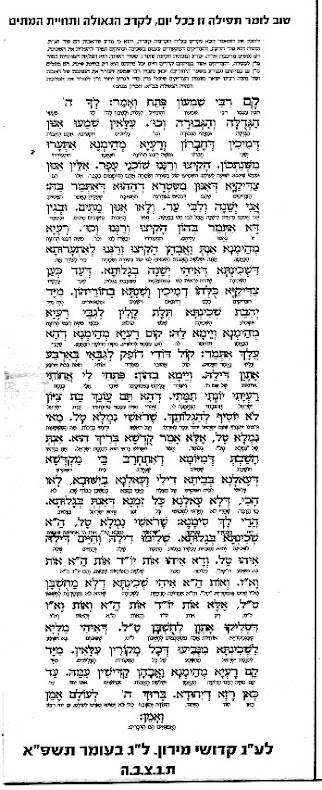This is an excerpt from Seeking Redemption Now by Rabbi Avraham Chaim Carmell, that I read on Shabbos, in Hamodia Inyan Magazine, July 7 2021. (typed by me and any errors are mine)
“Sefer Bamidbar, which we will include this week is, as its name denotes, all about golus. […]
“The tumultuous events of the last year and a half make it very clear that the time is ripe to bring moshiach now. What should we be focusing on? is the question on every thinking person’s mind. As an answer, a colleague of mine, Harav Pinchas Zaltzman, shlita, Rosh Kollel of the Boston Shas Kollel in Beitar, brought the following Chazal to my attention (quoted by Rashi and the Radak on Hoshe’a 3:5).
“Rabi Shimon ben Yochai taught: Bnei Yisrael rejected *three things during the time of Rechavam [son of Shalom Hamelech] – the sovereignty of Heaven, the monarchy of the House of Dovid and the Beis HaMikdash …Rabbi Shimon ben Menasha said, “Yisrael will not see any sign of blessing [i.e. redemption (Yalkut Shmuel 1:8)] until they return and seek these three…’ Indeed, in this passuk, the Navi Hoshe’a prophesied that before Mashiach comes, ‘then Bnei Yisrael will return and… seek [a] Hashem their G–D, and [b] Dovid their king, and [c] they will anxiously wait (Malbim) for Hashem and His goodness at the end of days (“His goodness” refers to the Beis HaMikdash, as in Devarim 3:25).”
“This message becomes all the more poignant when one considers the previous pesukim in Hoshe’a. Under Hashem’s instruction the Navi acquired a wife for 15 shekel and a measure of 30 se’ah of barley and 15 se’ah of barley. The Gemara (Chullin 92a) explains that the 45 se’ah refers to 45 tzaddikim in whose merit the world exists – 30 from Eretz Yisrael and 15 from chutz laAretz. The Gemara continues to say that most of these tzaddikim are not publicly known. Rashi on the verse says that it refers to the period between Pesach and Shavuos.
“This description brings to mind in chilling detail the recent tragedy in Meron, which all of our Gedolim have said was a wake–up call for us to do teshuvah. And the Navi has told us what is expected of us in order to bring the much awaited Geulah.
_______________________
Rabbi Avraham Chaim Carmell studied in Manchester and Gateshead Yeshivos in England and in Yeshivas Ponevez. Since 1980, he has been teaching in Boston Kollel, Yerushalayim. His articles have appeared in Hamodia since its inception.
The beginning and remainder of this article which goes into the detail of the *three things, can be found in the most recent copy of the Hamodia, available at newsstands and by subscription at https://hamodia.com
[Me: this article appealed to me because I find my inner self is in limbo, waiting for …. what is to come next. That is why I posted this article under the title “Foundation of the Third Beis Being Uncovered in Our Day” – https://habayitah.blogspot.com/2021/07/foundation-of-third-beis-being.html. The Western Wall Excavations and the City of David Excavations is, in my opinion, the building of our next Third Beis HaMikdash (covertly). I’m sure readers can identify with this feeling. Your comments appreciated.]

